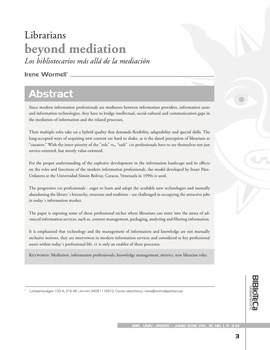Librarians beyond mediation
DOI:
https://doi.org/10.22201/dgb.0187750xp.2016.1.137Palabras clave:
Mediation, information professionals, knowledge management, metrics, new librarian rolesResumen
Since modern information professionals are mediators between information providers, information users and information technologies, they have to bridge intellectual, social-cultural and communication gaps in the mediation of information and the related processes.Their multiple roles take on a hybrid quality that demands flexibility, adaptability and special skills. The long-accepted ways of acquiring new content are hard to shake, as is the dated perception of librarians as “curators.” With the inner priority of the ”role” vs., “task” lis professionals have to see themselves not just service-oriented, but mostly value-oriented.
For the proper understanding of the explosive development in the information landscape and its effects on the roles and functions of the modern information professionals, the model developed by Iraset Páez- Urdaneta at the Universidad Simón Bolivar, Caracas, Venezuela in 1990s is used.
The progressive lis professionals - eager to learn and adopt the available new technologies and mentally abandoning the library ́s hierarchy, structure and tradition – are challenged in occupying the attractive jobs in today ́s information market.
The paper is exposing some of those professional niches where librarians can enter into the arena of advanced information services, such as, content management, packaging, analyzing and filtering information.
It is emphasized that technology and the management of information and knowledge are not mutually exclusive notions, they are intervowen in modern information services and considered as key professional assets within today ́s professional life. it is only an enabler of these processes.
Descargas
Citas
Association of Independent Information Professionals [en línea]. <http://www.aiip.org/>
In 2015 has carried out an extensive survey and co- llected detailed information on age, salary, working hours, education, experiences, employment, etc., of their members. The results have been analyzed and published by:
Bates, Mary Ellen. 2016 Info-Entrepreneur Market Report: insights on information businesses [en línea]. <https://mebs.files.wordpress.com/2015/06/2016- info-entrepreneur-market-report1.pdf>
IFLA Trend Report [en línea]. <http://ifla.org>
This is more than a single document – it is a se- lection of resources to help you understand where libraries fit into a changing society
The ifla Trend Report identifies five top level trends which will play a key role in shaping our fu- ture information ecosystem:
• trend 1: New Technologies will both expand
and limit who has access to information.
• trend 2: Online Education will democratize
and disrupt global learning.
• trend 3: The boundaries of privacy and data
protection will be redefined.
• trend 4: Hyper-connected societies will listen to
and empower new voices and groups.
• trend 5: The global information environment will be transformed by new technologies it is underlined that technology and the manage- ment of information and knowledge are not mutually exclusive notions, but it is only an
enabler of these processes.
Kurtz, Michael J.; Bollen, Johan. Usage biblio- metrics. Annual Review of Information Science and Technology, 2010, vol. 44, p. 1-64.
Libraries transform campaign: a Website of the American Library Association [en línea].
Designed to increase public awareness of the value, impact and services provided by libraries and library professionals, the Libraries Transform campaign will ensure there is one clear, energetic voice for our profession. Showcasing the transformative nature of today’s libraries and elevating the critical role libraries play in the digital age.
The ways in which libraries transform are as nuanced and varied as the people they serve. Physical transfor- mations are easy to spot. Transformations in service and scope can be less apparent, but are ever changing.
Páez Urdaneta, Iraset. La formación de los profesionales de la información en América Latina, la situación labo- ral y el mercado potencial de trabajo. En: Gestión de la inteligencia, aprendizaje tecnológico y modernización del trabajo informacional: retos y oportunidades. Caracas: Uni- versidad Simón Bolivar: Consejo Nacional de Investiga- ciones Científicas y Tecnológicas, 1992. 253 p.
Tague-Sutcliffe, J. An introduction to informetrics. Information Processing & Management, 1992, vol. 28, no. 1, p. 1–3.
Thelwall, Mike, Haustein, Stefanie, Larivière, Vin- cent, Sugimoto, Cassidy R. Do Altmetrics work? Twitter and ten other Social Web Services [en línea]. PLoS one, 2013, vol. 8, no. 5, http://dx.doi. org/10.1371/journal.pone.0064841>
Wormell, Irene. Databases as Analytical Tools. En: En- cyclopedia of library and information science. Exe- cutive editor Allen Kent. New York: Marcel Dekker, 2002. Vol. 70, Suppl. 33, p. 77-92.
-----------. Informetrics - a new area of quantitative stu- dies. Education for Information, 2000, vol. 18, no. 2/3, 131-138.
Wormell, Irene. Informetrics: an emerging subdiscipli- ne in information science. Asian Libraries, 1998, vol. 7, no. 10, p. 93-104.
-----------. Informetrics and the use of bibliographic data in a strategic combination. En: Emerging Frameworks and Methods: Proceedings of the Fourth International Conference on Conceptions of Library and Informa- tion Science. (CoLIS 4). Harry Bruce, Raya Fidel, Pe- ter Ingwersen and Pertti Vakkari, editors. Seattle, wa usa, July 21-25, 2002. Greenwood Village, Colorado: Libraries Unlimited, 2002.
-----------. Infometrics and Webometrics for Measuring Impact, Visibility, and Connectivity in Science, Po- litics, and Business. Competitive Intelligence Review, 2001, vol. 12, no. 1, p. 12-23.
-----------. Multifunctional information work - new de- mands for training? En: Proceedings of the 1st British- Nordic Conference on Library and Information Studies, 24-25 May 1995. Copenhagen: Royal School of Li- brarianship, p. 45-50.
-----------. Skills and competencies required to work with Knowledge Management [en línea]. En: Knowledge Management: libraries and librarians taking up the challenge. Edited by Hans Christoph Hobohm. Mu- nich: Saur, 2004, p. 107-114. ifla Publications, 108. <http://kmeducationhub.de/skills-and-competencies- required-to-work-with-knowledge-management/>

Descargas
Cómo citar
Número
Sección
Licencia
Descargar el formato de Cesión de derechos en formato PDF:
Formato de Cesión de derechos
Imprímalo y una vez que lo haya firmado envíenoslo vía fax o por correo a:
Revista Biblioteca Universitaria:
Dirección General de Bibliotecas y Servicios Digitales de Información de la UNAM
Departamento de Publicaciones
Edificio de la Biblioteca Central, 11o Piso,
Circuito Interior, Ciudad Universitaria, 04510 México, D.F.
Tel 5622-1616,
Fax: 5622-1601,






